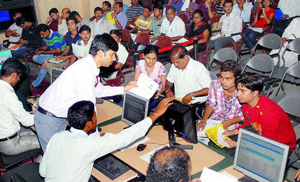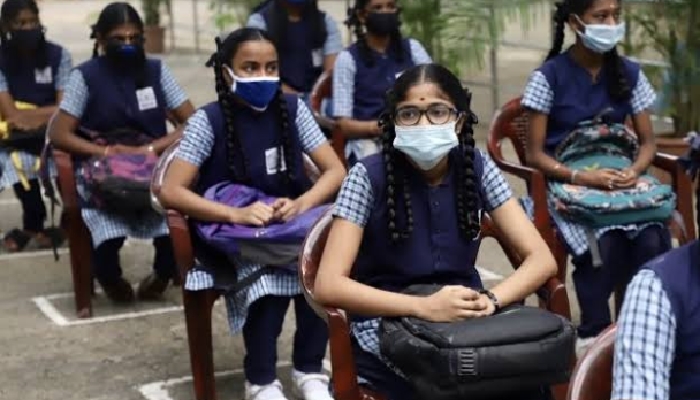 Bangalore, Jul 13: The confusion and chaos over the payment procedure for admission to undergraduate professional courses and the subsequent seat allotment continued on Friday at the Karnataka Examinations Authority (KEA) office here as parents and students scrambled to get their doubts clarified.
Bangalore, Jul 13: The confusion and chaos over the payment procedure for admission to undergraduate professional courses and the subsequent seat allotment continued on Friday at the Karnataka Examinations Authority (KEA) office here as parents and students scrambled to get their doubts clarified.
The KEA did not appear to have learnt any lessons from the mismanagement that reigned on Thursday. There was hardly any extra effort to address the grievances of parents and students.
All the KEA did was to set up a few extra counters to help parents.
Shubham Kaushik who was allotted a seat in Oxford College of Engineering reached KEA office at 9.30 am and wanted to show his admission order (the document generated after payment is made) to the authorities. He wanted to know what to do next.
“I had no option but to come here because the helplines were always busy. Even if calls were returned, there were no satisfactory answers. They would just ask us to visit the website which anyway offers only incomplete answers,” Kaushik explained. He waited for a good three hours without getting an answer.
Arumugam"s daughter, with a rank of 35,000, was allotted an aeronautical engineering seat at the ACS College of Engineering. But her first preference was a computer science engineering seat.
“She entered as many as 25 options in various branches and colleges. As it is online allotment, she wanted to avoid a situation where she would end up getting nothing.
Hence, she opted for as many branches for which she made the cut off,” Arumugam said but hastened to add that his daughter did not desire it.
“Why can"t the KEA give at least three allotments instead of just one?” he asked.
No options
Students pointed out that the CET brochures and the CD given during document verification indicated there would be options during the first allotment where they were to specify whether they want to take part in the second round or skip it altogether.
“But these options were not at all given during the allotments whereas we want to attend the second round,” said Manasa Hari who wants to exchange her biotechnology seat at PESIT with a civil engineering seat at the National Institute of Engineering (NIE), Mysore.
Ambiguities in the instructions given by KEA officials as well as the brochures were the greatest irritants to students and parents. Karan M Jain, a student, complained: “I want to know whether I get a refund if I opt out of CET. An official said there would be no refund.”
However, the KEA Administrative Officer, S P Kulkarni, clarified that only Rs 5,000 would be deducted.
The payment procedure was marred by glitches as several parents and students faced one problem after another.
A parent, who did not wish to be named, said he had to pay Rs 46,000 twice for a seat at Kasturba Medical College, Manipal because of a technical default.
Internet traffic
“While the online payment was being processed, the payment link on the website hanged and even after six hours I could not get the admission order. I?paid again just to ensure I?get the seat. But I want the refund of excess amount,” he said.
When the KEA website did not open for some time because of heavy traffic on Thursday, a desperate Akshay S A went directly to a bank and deposited the prescribed fee without indicating his CET number or his Unique Transaction Reference (UTR) number.
Madhav Kumar got a seat at Reva Institute of Technology and paid through Indian Bank.
“The challan payment through Indian Bank is very smooth and the most suitable for making payments. I have personally seen many people facing problems while making payment through other banks,” he said.
With a notepad, Nitin Bhushan, who got a seat at T John Institute of Technology, guided a group of students confused about the payment procedures.
“Although the KEA tried well to use technology, it hasn"t supported it with a proper guidance mechanism,” said Kumar.





Comments
Add new comment